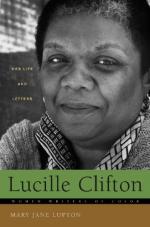|
This section contains 549 words (approx. 2 pages at 300 words per page) |

|
SOURCE: "Simply American and Mostly Free," in The New York Times Book Review, February 19, 1989, p. 24.
Below, Rosenberg sees Clifton as a storyteller whose work is rooted in her own personal history
The writer Clarence Major once noted that black American poetry is almost always, in some sense, a reaction to slavery—and therefore often concerns itself with the right to Being. Lucille Clifton is a poet who grapples mightily with such questions. Her poetry is direct and clear: full of humor and forthrightness, tenderness and anger. She has no sentimental hankering after the past: "'Oh slavery, slavery,' my Daddy would say. 'It ain't something in a book, Lue. Even the good parts was awful.'"
Her work is grounded in her own personal history, revealed most beautifully in the long memoir at the end of Good Woman: Poems and a Memoir. A sure sense of self reverberates...
|
This section contains 549 words (approx. 2 pages at 300 words per page) |

|


